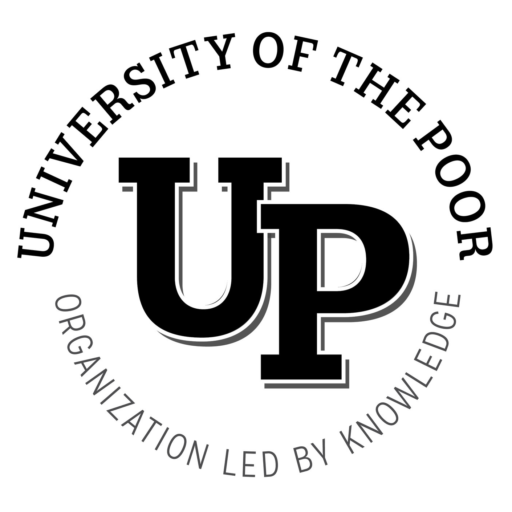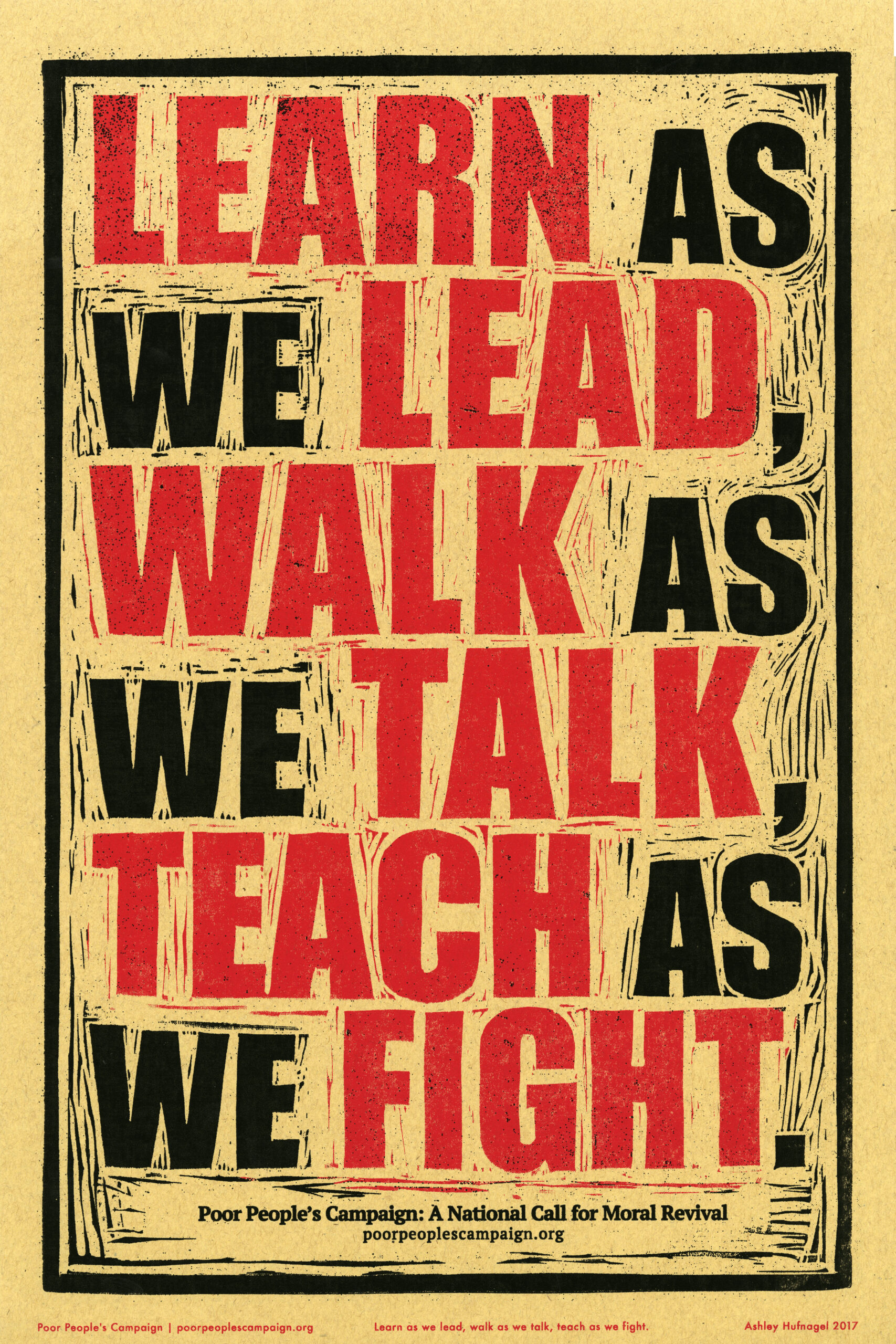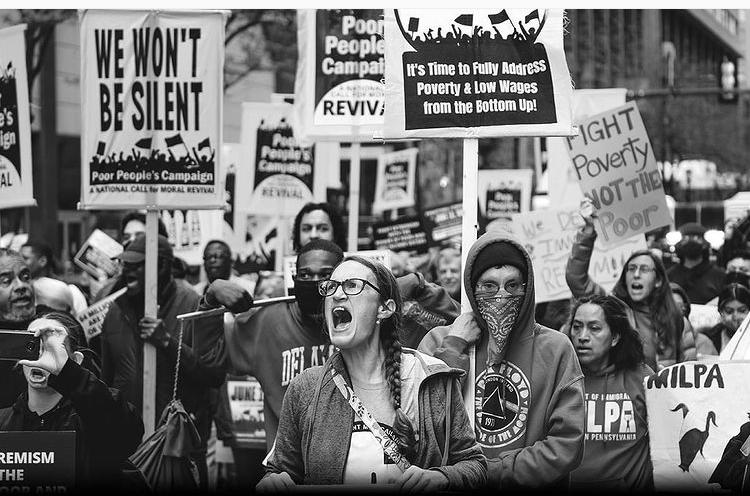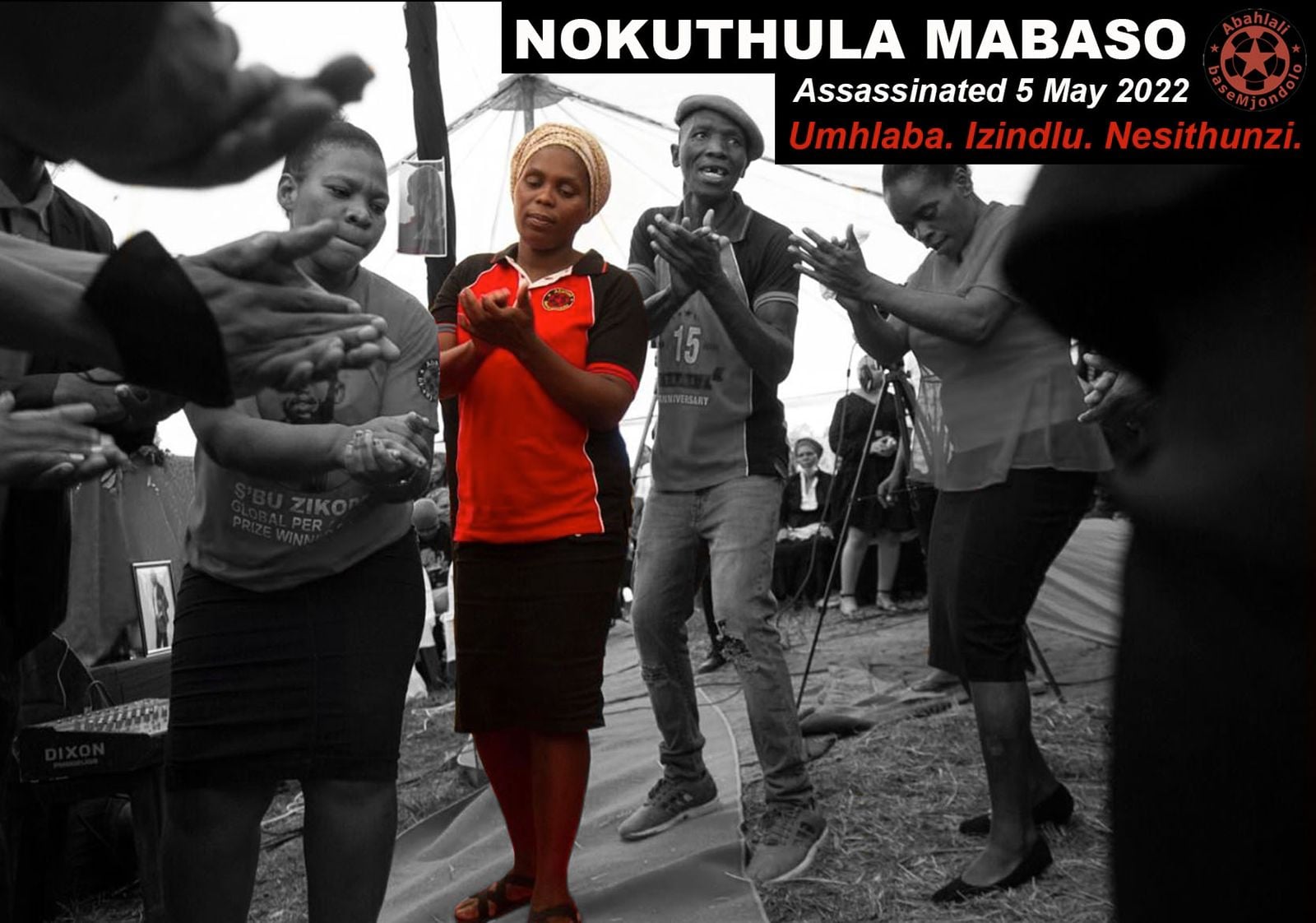In the winter of 2021, the University of the Poor released its second issue, “Making the Struggle a School.” Below are two reflections on the issue, written by Kymberly Smith, an organizer based in South Carolina with the Party for Socialism and Liberation and Lindsey Jordan, an organizer based in North Carolina with Raise Up the South. Please consider submitting your own reflections to this issue of the journal!
Getting Where We Need To Be
By Kymberly Smith
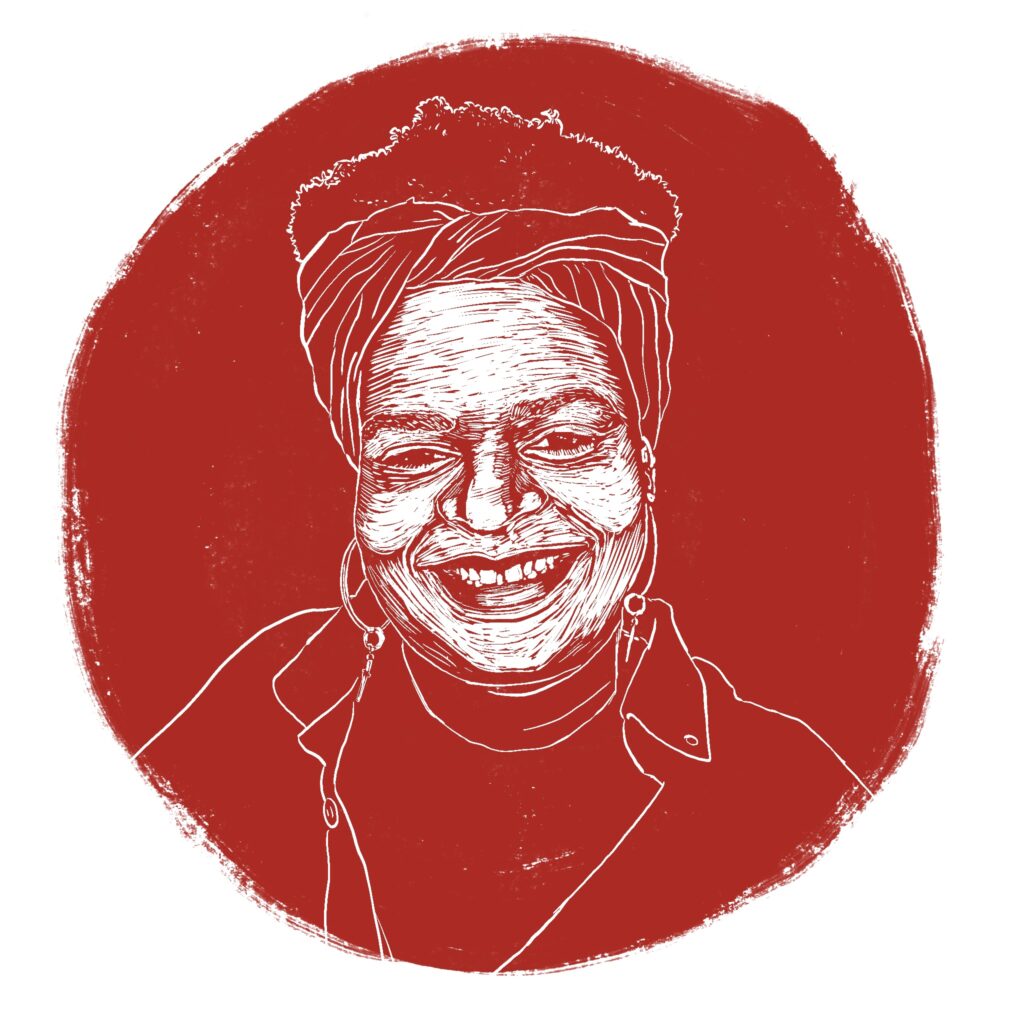
As I reflect on the University of the Poor’s issue, Making the Struggle A School, I can’t help but reflect on where we are in this current moment. I can’t help but think about where we were when the issue was written and all of the things that have come about since then.
Right now, two years into a global pandemic, environmental devastation is worsening in the South, Medicaid is not being expanded, abortion access is under attack, and simaltaneously we see organizing among the poor and dispossessed in a place it hasn’t been in years.
Countless workers are forming unions and mutual aid organizations are popping up all over to try to create the communities of care that the working class so desperately needs. Thinking through these challenges and opportunities that the crisis in capitalism has shown us, what has become more apparent is the need for us as organizers to make the struggle a school. This issue is so timely, and is already proving to be an asset to orienting our class on why it’s important to continue to not only be fighters, but to constantly be thinkers.
Thinking through some of the pieces that stood out to me most and where we are now, Carolyn Baker’s words echo: There are things we hold on to that we don’t even realize and we defend them. This makes me think about what some people are beginning to build in this period, creating organizations dedicated to community care. Carolyn’s words are a reminder that we are all born with the birthmarks of capitalism, and as we continue to lead and teach each other, we must be able to struggle with each other and actively listen so that we can begin the revolutionary work of building together in order to face our enemy.
As I reflect on being a part of an organization during this period, I find myself thinking greatly about not only how and why we organize, but WHO we organize. Right now, it is more important than ever for us to ensure that we are organizing from the bottom – and not only organizing, but educating and learning from the people who have more knowledge of the inner workings of this system than most of us ever will. The people who are fighting for their basic human rights to food, housing, water and family are the leaders that just need a higher level of analysis that the ruling class denies them. Willie Baptist and Marian Kramer beautifully illustrate the thought process behind the welfare rights struggle and why it is imperative to educate people on who the enemy is, so that instead of blaming themselves for their conditions, they can point the blame where it should be – at the ruling class. Your problem is that you don’t know who the damn enemy is. Without that you aren’t able to have an effective plan to correct what is going on. Marian Kramer’s words underscore what our main task is today: educating people on who the enemy is so that they can join the revolutionary struggle and develop a new layer of leadership themselves.
Willie Baptist reminded me that the only way to even begin the revolutionary process is to organize, and not just for reforms that can be taken away. We must remember that we are organizing to take power, and for that we can not only be angry, we have to be organized: You can express your moral outrage, you can fight for this legislation or that legislation, and they might concede it, give it to you, but they can also take it away. In welfare rights, we say we only get what we’re organized to take. Freedom isn’t free. If I give you something, I can take it away. We’ve got to organize, organize, organize.
Making the Struggle A School is not only an issue that should be read within organizations, but studied. The lessons that have been gathered across organizations and leaders from around the country can be wielded as tools to further our work and allow us to continue to understand where we are in the movement today and what we need to be putting at the forefront of our minds so that we can get where we need to be.
Growing Tomatoes, Growing a Movement
By Lindsey Jordan
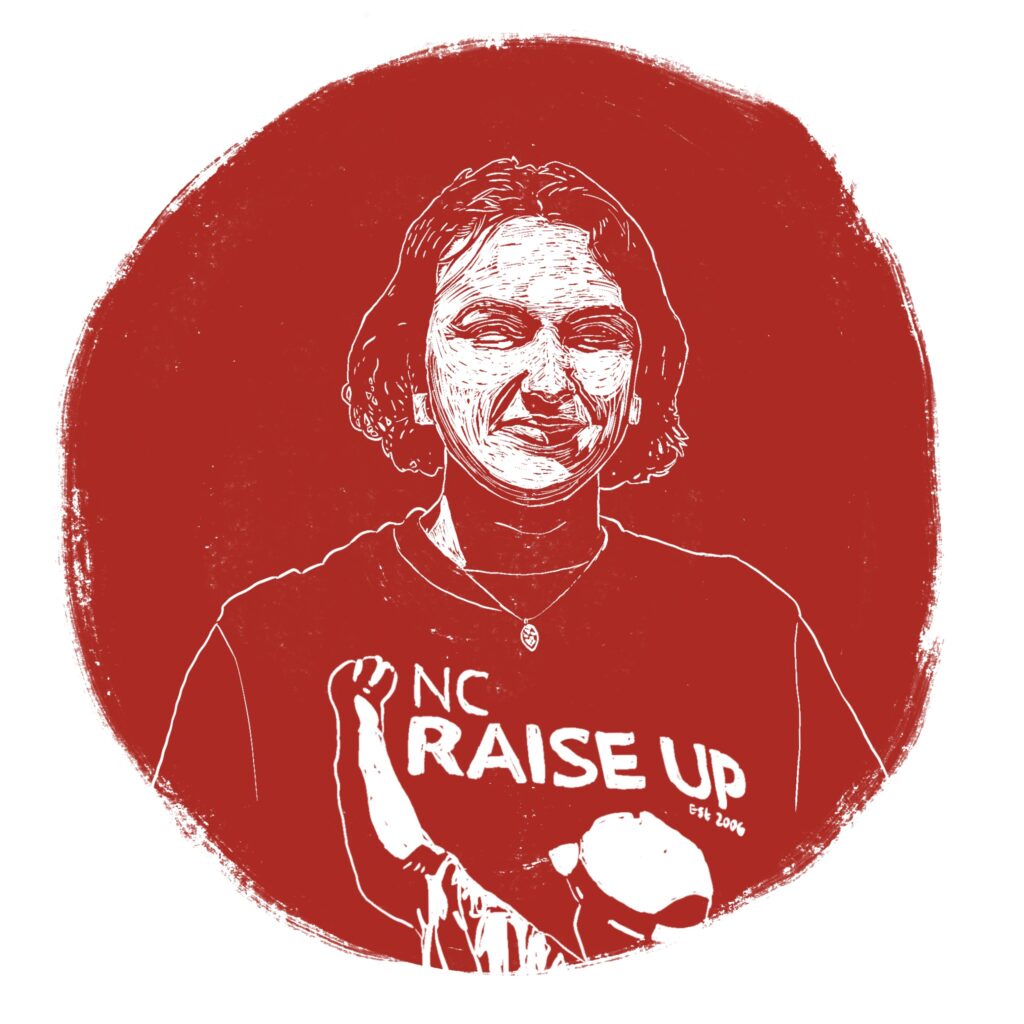
Recently, I’ve been thinking a lot about what tomato seeds have to do with organizing a worker at McDonald’s.
In early March, 2022, a group of about 75 Raise Up organizers – both experienced and new – sat in a circle, holding a few seeds in their hand. They weren’t told what kind of seed they were given. A lot of them called out guesses: mustard seed, cucumber seed, some kind of wildflower seed.
I asked them how we could find out what kind of seed it was. “We could look it up online.” “We could talk to a farmer.”
I asked them: “What do we need to know to find out how to grow a tomato? Could I throw it here on the carpet and expect it to grow?” “No,” they responded. “We need to plant it.”
“What do we need to know in order for the seed to grow when we plant it?”, I asked.
“We need to know about the soil, how deep in the ground to plant it, what time of year it grows best.” As a group, we learned everything we need to know about growing tomatoes. “But what if it’s been 3 months and we have a stalky plant with no tomatoes? What do we need to know in order for us to figure out why we don’t have any tomatoes? Are we in a drought? Is the plant getting too much sun? Is there a pest?”
“Now let’s say we did it. We addressed what was going wrong and now we have a bounty of beautiful, ripe tomatoes to eat. “But we want to grow tomatoes again next summer. Do we know absolutely everything we need to know in order to grow them next year?”
The reply: “No, because conditions are always changing. We can and should learn from what we did this year, but things might not be the same next year.”
There are many lessons to be learned from tomato seeds. We must learn from others. We need to know about the concrete conditions that allow a tomato to grow. We must recognize that things don’t always go according to plan, so we should constantly analyze the situation. We know that we must learn from history and from our experience, while at the same time recognizing that conditions aren’t static. And we need to know how to adapt in order to get what we need – in this case, tomatoes to eat.
In the last University of the Poor Journal, Making the Struggle a School, Sarah Weintraub writes, “To really make the struggle a school, to point ourselves fully towards the development of our leaders, will require us to uproot the pragmatism we are all steeped in that pushes us into a process of mobilize, win or lose, rinse, and repeat.” As organizers, it matters how we think. And we know that we’re up against an enemy who knows that combatting pragmatism is a threat.
My mom teaches high school in rural North Carolina. In February of this year, she texted me outraged at a remark from the North Carolina State Superintendent:
“We’ve got to redefine what the purpose of K-12 education is. Some would say it’s to produce critical thinkers. But my team and I believe that the purpose of K-12 education is to prepare students for post-secondary plans of their choice so that they can be a functioning member of the workforce.”
The statement is enraging, but not surprising. As Karim Sariahmed and Ellen Schwartz write, this is why we must make the struggle a school. “It is to the advantage of the ruling class if we believe we’re not capable of thinking and studying, and most working-class people don’t get a real chance to think critically about or study capitalism itself.”
Working class people are taught to believe that we’re not good thinkers. We’re not people who ask good questions or have good answers. We’re certainly not the class of people who can tell you what’s going on in the world: why we’re poor and what we can do about it. But from my experience organizing low-wage workers, a McDonald’s worker making $8 an hour in the middle of a pandemic (while the CEO makes more than $10.8 million in a year) knows what’s going on in the world. And 9 times out of 10, when I ask a worker what they think it’s going to take to change things, they tell me something along the lines of: “Well, if we all got together, things would be different. If we all didn’t work, the store couldn’t run, and things would be different.”
We’re not just growing tomatoes, though. We’re trying to grow a movement, and we have to know as much as we can about what will make that movement grow. Developing leaders from among the low-wage workers who are most affected by the ills of society will give us a chance to make things really different. We must think about tomato seeds, because when we ask why, when we agitate, and when we organize, organize, organize, we make the struggle a school.
